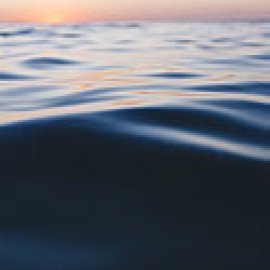Nocturne
-
English
-
ListenPause
[intro music]
Welcome to World Ocean Radio…
I’m Peter Neill, Director of the World Ocean Observatory.
To listeners to World Ocean Radio over the past few weeks, it may feel as if a black swan has crossed my view. Let’s acknowledge again that these are troubled times; the strange litany of our political discourse, the unnerving evidence of the power of the oceanic present against the revealed frailty of our edges and protections, the upsetting of past norms and patterns by new weather systems, suddenly real and unrelenting. I owe you an explanation, perhaps an exhortation.
On the surface, the reasons are obvious: in the media constantly, in our conversations often, and in our inner thoughts more profoundly than perhaps we have realized as a cause for our condition. I was listening to music recently; it was a piece by Chopin, a nocturne, romantic, dreamy, evocative of the night. I drifted off into a meditative state, not really asleep, because in my mind’s eye, I was at a helm, under sail, a night passage, from where to nowhere, alert to the sight, sound, and feel of the place, the wind right in the sails, the boat moving just so, hand on the tiller, aware and very much alive to the night. The conditions, not always so, were just right for reflection, apart from surface thoughts and anxieties, as if things were secure and safe, with an intimate outside horizon melding into an expansive inner state, alert and without fear.
Nocturne. A night passage.
The ocean is a creative space. It calls for humility, experience, and imagination to get from one place to another. Always changing, always surprising, it demands a competent response, a commitment, and an understanding that success is infrequently the result of a solo crossing, much more often a partnership between vessel and the natural circumstance, between captain and crew, between crew and each other. The time is regular, but ongoing, the space is infinite, in all directions, and the only unchanging force is the force of change itself. A dream space, a place for clarity and perspective, enough to invent a future.
My ruminations were explained by my momentary loss of confidence in our mutual ability to imagine what comes next. When asked how to respond to the climate crisis, I have offered the solution of choice: to pick one thing that pertains, and invest all energy into something that can be accomplished by an individual in concert with others of the same belief. The scale of the problem is met by allied energy and focus, and progress is the addition of one success after another, enabled by the many. My stand at the watch, the manifestation of my dream, suggested another tactic. If I can imagine change, if I can envision a transformational outcome, I can find another way toward which to guide my engagement. If I can work backward from an ideal, I can apply my time and talent to the waypoints there. It may be that my course is entirely different from what I have thought available or practical in the past. It may be that I ask myself to do something I have never done before, to join an unknown, now identified as change imagined and a rejuvenating, inspirational way forward, no longer alone, but embraced by a new personal and collective history.
What if I engaged in a self-reinvention, not abandoning my ideals, or even my experience, but choosing a completely different means by which to express them? What if I choose to step outside the problem and into a newly conceived solution? What if I created change, not reacted to it? What if I adopted that frame of mind, followed it forward? Would not that courage, that optimism, inform both my state of mind and my behavior? By so doing, would not my solo night passage sail me, and my shipmates, into the clarifying light of a new day?
So, Citizens of the Ocean, if you see or hear this beamish boy, I urge you to sign on, or to climb aboard. No more dour, no more despair. It’s time we move away from darkness and paralysis and uncertainty, and, flags flying, bow wave proud, all hands on deck, to make forward our way.
We will discuss these issues, and more, in future editions of World Ocean Radio.
World Ocean Radio is distributed by the Public Radio Exchange and the Pacifica Network for use by college and community radio stations worldwide. Find us wherever you listen to podcasts, and at world ocean observatory dot org where the full catalog of more than 700 World Ocean Radio episodes is searchable by theme.
[outro music]
A nocturne is a short musical composition: dreamy, romantic, suggestive of the night, a passage from one place to the next. This week we're asking: What comes next for our collective energy and focus? What it is that will get us safely from this place of climate crisis and uncertainty to another place of reinvention, newly-conceived solutions, and sustainability? We are committed to talking about it, and we urge you to join us as we dream of a new way forward.
About World Ocean Radio
World Ocean Radio is a weekly series of five-minute audio essays available for syndicated use at no cost by college and community radio stations worldwide. Peter Neill, Director of the World Ocean Observatory and host of World Ocean Radio, provides coverage of a broad spectrum of ocean issues from science and education to advocacy and exemplary projects.
World Ocean Radio
14 Years, 700+ Episodes
Ocean is climate
Climate is ocean
The sea connects all things
- Login to post comments



